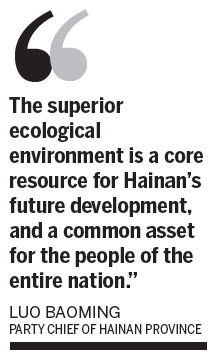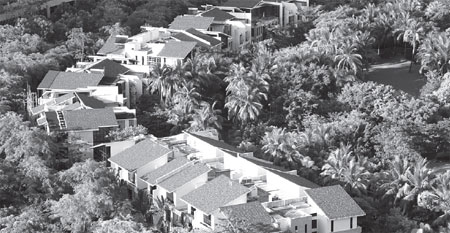Hainan Special: Hainan: Breath of fresh air
By Zhang Zhao and Huang Yiming (China Daily) Updated: 2014-03-12 07:22
When Zhang Jing arrived in Haikou, capital of Hainan province, on Feb 24, he recalls being greeted by a breeze of warm, fresh air.
"I live in the inland area, where the smoggy weather makes me feel bad," said the tourist whose hometown is Xi'an in Northwest China's Shaanxi province.
"But here in Hainan, the clear, blue sky has delighted me greatly."
The air quality in Hainan has become an attraction to tourists across the nation.
During the Spring Festival holidays that lasted from Jan 31 to Feb 6, the province welcomed more than 2.6 million tourists, an increase of 36.9 percent year-on-year.
Tourism generated revenue totaling 7.6 billion yuan ($1.24 billion) during the period, up 34 percent annually compared to last year.
This trend is being driven by the allure of the island's natural environment and climate, said officials from Hainan's tourism administration.
The provincial government has made ecology a priority in its strategic planning.
According to a report by Greenpeace, the average thickness of PM2.5 in Haikou was 25.6 micrograms per cubic meter last year, out-ranking the air quality seen in the 73 other sampled cities nationwide.
Last year, Hainan expanded forested areas by 302 square kilometers, raising the rate of forest coverage to nearly 62 percent.

The government invested 853 million yuan in projects to protect the environment in the urban areas as well as the countryside, including 26 projects to promote the efficient use of energy and resources.
Some 1,000 villages across the province were selected as eco-friendly villages. Five paper mills were shut down last year for excessive pollution, and 22 projects were rejected because of their potential for pollution and energy inefficiency.
At the same time, 35 new garbage transfer stations were built.
This year, the plantation coverage in Hainan's urban areas is aimed at 35 percent increase, according to the provincial government's 2014 work report.
The government plans to build a national tropical rainforest park and a national ocean park.
Other priorities will include the development and promotion of clean energy, green buildings and new-energy vehicles.
Meanwhile, it will continue to fight against deforestation and the illegal discharge of pollutants through stronger enforcement.
"The superior ecological environment is a core resource for Hainan's future development, and a common asset for the people of the entire nation," said Luo Baoming, Party chief of the province.
Contact the writers at zhangzhao@chinadaily.com.cn and huangyiming@chinadaily.com.cn
|
A residential zone in Hainan. Forests cover about over 60 percent of the island's area. Huang Yiming / China Daily |
(China Daily 03/12/2014 page16)
- 'Cooperation is complementary'
- Worldwide manhunt nets 50th fugitive
- China-Japan meet seeks cooperation
- Agency ensuring natural gas supply
- Global manhunt sees China catch its 50th fugitive
- Call for 'Red Boat Spirit' a noble goal, official says
- China 'open to world' of foreign talent
- Free trade studies agreed on as Li meets with Canadian PM Trudeau
- Emojis on austerity rules from top anti-graft authority go viral
- Xi: All aboard internet express








